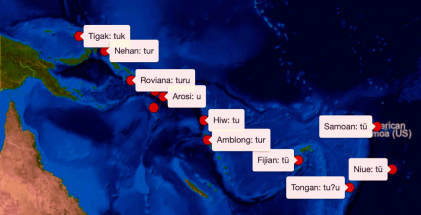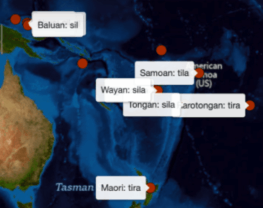Kiwi Songs - Maori songs - Home
|
Wi Huata wrote this song and taught it to his children whilst on a family gathering to Lake Tutira, north of Napier. He was explaining how the iwi came together here to support each other. Later he used this song to promote Moral Re-armament, uniting different cultures.
Long Vowels
1.
Tutira
|
| A |  |
| D |  |
| B7 |  |
| E7 |  |
Canon Wiremu (Wi) Te Tau Huata, MC, QSO, CBE (1917 - 1991)
Early Years
From the age of 7 on, he attended Mohaka Native School. This meant walking about four miles each way, barefoot. When he was nine he had pneumonia and was unconscious for ten days. In 1933, aged 16, he began form three at Te Aute College which had just become a theological college also. He was ordained as an Anglican priest in 1940. While serving as assistant curate in Hastings, he developed contacts with the Tomoana family.Army Chaplain
In 1943, he joined the 28th New Zealand (Maori) Battalion as chaplain. Padre Huata 1943 |
He was conned by the Colonel of the battalion to accompany the men on the front line of the battle, where he became father-confessor to soldiers of all denominations. His duties included finding bodies and supervising the digging of trenches for the dead - both Maori and German - reading the burial service, and recording the location of the burials.
When
they were back in the rear, he captained the
battalion rugby team, helped to stage concerts, and
conducted prayers and hymns before battle again. He
learnt Italian songs and he was famous for his
rendition of 'Buona notte mio amore,' providing a
running commentary as he went.
| Buona
notte mi' amore Buona notte mio cuore Sogna tutti miei baci Sogna sola di me . . . |
Goodnight
my love Goodnight my heart I dream of many kisses I dream only of you . . . |
Pastoral work
Captain Wi Huata MC returned to new Zealand with the Maori Battalion in January 1946, and returning to Hastings to resume his ministry, he married Ybel Tomoana, daughter of Kuini and Paraire Tomoana. After a stint in Rotorua, he moved, in 1952 to the King Country and Waikato. He organised hui and church conventions, including a national hui at Ngaruawahia in 1962. He also set up He Toa Takitini, an association to promote Maori arts and crafts and goodwill; its concert party travelled to marae around the country and in 1966 to Australia. He also assisted the Maori Women's Welfare League and promoted Moral Re-armament amongst Maori.After his retirement in 1982 he was involved with the Tu Tangata and Kohanga Reo. In 1986 he travelled to San Francisco to lift the tapu on the Te Maori art exhibition there. He died in Hastings in 1991 and was buried at Ramoto, Wairoa.
For more details see, Huata, Wiremu 1917 - 1991, Dictionary of New Zealand Biography
The Moral Re-Armament movement
Current initiatives are aimed at:
-
Encouraging care and responsibility in personal
relationships and family life, in place of
'me-centredness' and blame;
- Strengthening
moral commitment in economic life, in order to
create jobs and tackle the root causes of poverty;
(Canon
Huata did much to get new industries established
in his home town of Wairoa, so as to create jobs
for his people there)
-
Strengthening the foundations of democracy that
guard against selfish interests, corruption and
indifference.
-
Forging networks among people from different
faiths and cultures.
(As president of the organisation known as
Te Kotahitanga Tautoru, Huata helped
develop a Maori inter-church, recreational and
cultural centre near New Plymouth)
-
Healing the wounds of history.
(Huata revitalised the Anglican church among Maori who associated it with the government's attack on Waikato)
Page
put onto website August 31
2003,
revised May 2008, April 2011 and March 2019.




